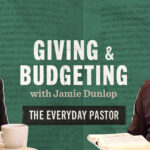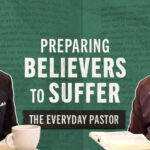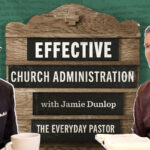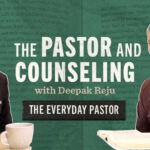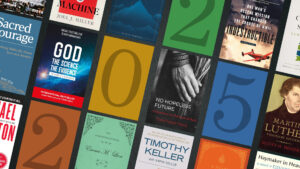On My Shelf helps you get to know various writers through a behind-the-scenes glimpse into their lives as readers.
I asked Walter Strickland—assistant professor of systematic and contextual theology at Southeastern Baptist Theological Seminary, co-author of Every Waking Hour, and contributor to Removing the Stain of Racism (B&H Academic, 2017) [review]—about what’s on his nightstand, books he re-reads, books that have shaped his understanding of racial justice, and more.
1. What’s on your nightstand right now?
I’m re-reading Plain Theology for Plain People by Charles Octavius Boothe and Latin American Theology: Roots and Branches by Maria Clara Bingemer.
2. What are some books you regularly re-read?
- Liberation and Reconciliation by J. Deotis Roberts
- Creation Regained by Albert Wolters
- The Uneasy Conscience of Modern Fundamentalism by Carl F. H. Henry
3. What books have most profoundly shaped how you view gospel ministry?
- The Prophethood of Black Believers: An African-American Political Theology for Ministry by J. Deotis Roberts
- Center Church: Doing Balanced, Gospel-Centered Ministry in Your City by Tim Keller
4. What books have most shaped your understanding of racial justice?
- Divided by Faith: Evangelical Religion and the Problem of Race in America by Michael Emerson and Christian Smith
- Black and Free by Tom Skinner
- Beyond Racial Gridlock: Embracing Mutual Responsibility by George Yancey
5. What biographies or autobiographies have most influenced you?
- Narrative of the Life of Frederick Douglass by Frederick Douglass
- Up from Slavery by Booker T. Washington
6. What are your favorite fiction books?
I didn’t learn to read until I was 9, and I didn’t develop a passion for reading until I discovered non-fiction (theological) books in college. As a result, I haven’t read much fiction (which I hope to change), but my favorite is The Screwtape Letters by C. S. Lewis.
7. Which book do you wish every evangelical would read and why?
The Christian Imagination: Theology and the Origins of Race by Willie James Jennings
Jennings beautifully demonstrates through historical narratives how theology itself has been infused with racial superiority. If you can stick with this rigorous read, it’s very helpful.
Bonhoeffer’s Black Jesus by Reggie L. Williams
This is an important book, because it depicts how a cross-cultural experience transformed Bonhoeffer into the figure whose pen we know and love. My hope is that this book demonstrates the value of being sharpened across cultural lines and that we would proactively pursue those opportunities.
The Cross and the Lynching Tree by James H. Cone
While evangelicals won’t agree with Cone theologically, he explains how the Christ event is viewed through the lens of historic or lived experiences. Cone views Christ through lynching in the African-American experience.
8. What are you learning about life and following Jesus?
The most significant lessons I’m learning are that this world is not my home, and that suffering is an opportunity for our spiritual growth to be supercharged.
Also in the On My Shelf series: Andy Crouch • Hannah Anderson • S. D. Smith • Curtis Woods • Mindy Belz • Steve Timmis • David Mathis • Michael Lindsay • Nathan Finn • Jennifer Marshall • Todd Billings • Greg Thornbury • Greg Forster • Jen Pollock Michel • Sam Storms • Barton Swaim • John Stonestreet • George Marsden • Andrew Wilson • Sally Lloyd-Jones • Darryl Williamson • D. A. Horton • Carl Ellis • Owen Strachan • Thomas Kidd • David Murray • Jarvis Williams • Gracy Olmstead • Matthew Hall • Drew Dyck • Louis Markos • Ray Ortlund • Brett McCracken • Mez McConnell • Erik Raymond • Sandra McCracken • Tim Challies • Sammy Rhodes • Karen Ellis • Alastair Roberts • Scott Sauls • Karen Swallow Prior • Jackie Hill Perry • Bruce Ashford • Jonathan Leeman • Megan Hill • Marvin Olasky • David Wells • John Frame • Rod Dreher • James K. A. Smith • Randy Alcorn • Tom Schreiner • Trillia Newbell • Jen Wilkin • Joe Carter • Timothy George • Tim Keller • Bryan Chapell • Lauren Chandler • Mike Cosper • Russell Moore • Jared Wilson • Kathy Keller • J. D. Greear • Kevin DeYoung • Kathleen Nielson • Thabiti Anyabwile • Elyse Fitzpatrick • Collin Hansen • Fred Sanders • Rosaria Butterfield • Nancy Guthrie • Matt Chandler
Browse dozens of book recommendations from The Gospel Coalition’s leaders and sign up your church at Hubworthy.
Download your free Christmas playlist by TGC editor Brett McCracken!
 It’s that time of year, when the world falls in love—with Christmas music! If you’re ready to immerse yourself in the sounds of the season, we’ve got a brand-new playlist for you. The Gospel Coalition’s free 2025 Christmas playlist is full of joyful, festive, and nostalgic songs to help you celebrate the sweetness of this sacred season.
It’s that time of year, when the world falls in love—with Christmas music! If you’re ready to immerse yourself in the sounds of the season, we’ve got a brand-new playlist for you. The Gospel Coalition’s free 2025 Christmas playlist is full of joyful, festive, and nostalgic songs to help you celebrate the sweetness of this sacred season.
The 75 songs on this playlist are all recordings from at least 20 years ago—most of them from further back in the 1950s and 1960s. Each song has been thoughtfully selected by TGC Arts & Culture Editor Brett McCracken to cultivate a fun but meaningful mix of vintage Christmas vibes.
To start listening to this free resource, simply click below to receive your link to the private playlist on Spotify or Apple Music.








